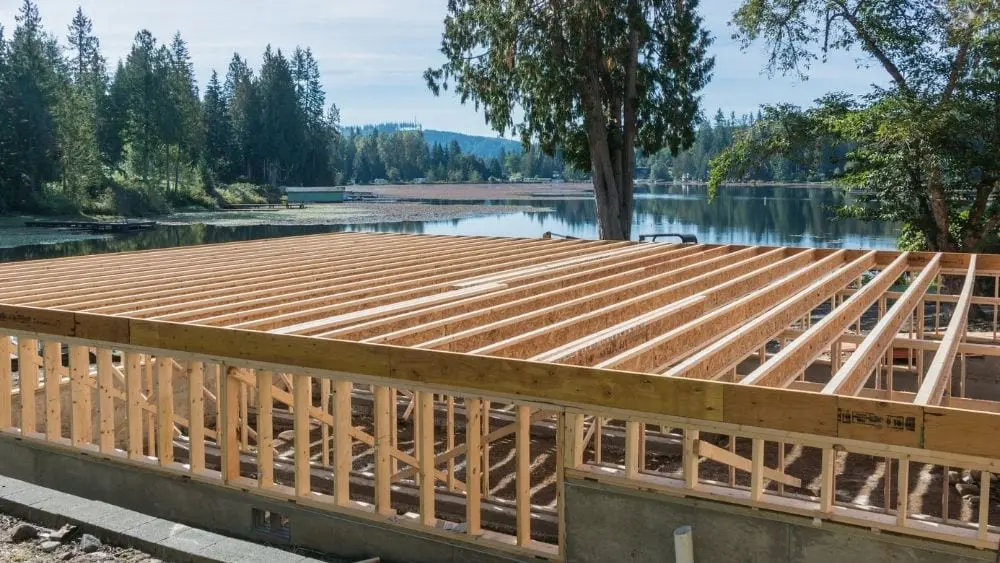
Oregon is known for its picturesque views and plentiful opportunities. Every year, newcomers flock to the Beaver State to start their next adventure in a gorgeous nature escape. There’s no better place to explore the great outdoors while also enjoying dazzling city attractions in places like Portland or Bend.
For new homebuyers in the Pacific Northwest, building their new dream home is an appealing option. By following the step-by-step home building process, the home is created to fit the buyer’s exact specifications and customized to meet their needs. As a bonus benefit, newly-built homes bring peace of mind that everything in and around the structure is brand-new and comes with a full warranty.
The cost to build a house may vary by state and design choices. New homebuyers in Oregon should take the time to familiarize themselves with the climate, construction costs, and required permits for their intended place of residence to avoid accidentally going over budget with added fees. Here are several important considerations to keep in mind when building a home in Oregon.
Climate Considerations

The climate in Oregon tends to be pleasant. Summers are often warm and wet with partly cloudy skies, while winters usher in freezing temperatures, blustery winds, and glistening snow. The mountainous terrain and the powdery snow make the perfect combination for an assortment of winter sports. New home buyers relocating from hot climates will be thrilled to know that Oregon rarely sees temperatures above 90 degrees in the summer.
There are six major natural disasters identified by the Oregon Department of Land Conservation and Development that can have major impacts on the region year over year. These include floods, landslides, earthquakes, tsunamis, coastal erosion, and wildfires.
Depending on the area of the state where homeowners choose to live, they may be at a heightened risk of droughts, dust storms, volcanoes, windstorms, and winter storms. Homeowners should consult with their local authorities to ensure proper mitigation planning, as well as proper land use precautions, are taken. A robust insurance plan with natural disaster coverage may be mandatory in higher-risk areas.
Expected Cost
The average cost to build a home in the U.S. in 2022 is around $284,158. The cost to build a home in Oregon is above the U.S. average, typically between $287,500 and $400,000. This amount will vary significantly due to a number of factors, including location, current demand, design choices, and whether the buyer already owns the plot. For example, in Portland, new homes may cost between $250 and $450 per square foot, depending on the choice of high-end or mid-value features.

Construction Timeline
Here is a step-by-step guide for building your new house in Oregon.
Buy Land
Per data from AcreTrader, the cost per acre of farmland in Oregon is around $3,120. The price will fluctuate given the size, location – city or rural – and access to electricity and water.
Permits and Paperwork
Most municipalities in Oregon require a building permit to begin construction on your new home. Your general contractor must submit plans, timeline, blueprints, and renderings to the permit-issuing authority where the residence is assigned. Permits usually cost between $1,200 and $2,000 for building, electrical, mechanical, and other add-ons. Failure to complete these necessary steps to obtain a lawful permit will more than likely result in hefty fines and construction delays.
Homebuyers should consult their local branch of government to learn more about the process to obtain the correct permits. The best way to get in touch with the appropriate building department is to search the local building department directory on Oregon.gov.
Site Prep
After purchasing the lot, homeowners must take steps to prepare the land for home construction. Keep this in mind as you shop for the perfect plot of land. Any plot with uneven terrain requires leveling or excavation, which will cost you a pretty penny. It’s a good idea to have the soil tested by an engineer, especially if the area is known to have rocky sediment or clay below the surface.
Knowing the soil composition gives buyers a leg up when deciding how much to budget for site preparation and foundation construction. It’s recommended that homebuyers budget at least $5,000 for land preparations before construction costs.
Additionally, buyers in rural areas will need to consider their water source if they are unable to connect to city water and sewer systems. If this is the case, homebuyers may need to drill a well or install a septic system. Similarly, site preparation requires a connection to the local electrical source. Homebuyers should consult their builder to learn more about the options in their area. The cost of water, sewer, and electrical connections in Oregon are within the range of the U.S. average costs.
Foundation

In many areas across Oregon, the freeze line is less than 24 inches below the ground surface, so basements are rarely used as a foundation. This reduces the appeal of a basement when the plot requires less excavation. Additionally, the soil is not naturally suited for basement construction as it often contains clay or rocky composition that is expensive to dig. However, homes built on slopes often include a walkout basement in Oregon, making this type of foundation common in cities. The cost of a foundation in Oregon depends on the site’s access to roads and the cost of materials but is similar to the U.S. national average costs for building a foundation.
Framing
Once the site is prepared and the foundation is set, the next step is building the frame. A house frame is a skeleton that provides a home with structure and three dimensions. Of all the stages of building a home, this is often the most expensive due to the materials and labor costs. The cost for framing a home in Oregon is in line with the national average cost to frame a house.
Roof
After the frame is in place, the roof provides a necessary shelter atop the home. For an average size single-family home with standard asphalt shingles, the cost of materials and labor to construct a roof in Oregon is usually between $5,600 and $11,500, similar to the U.S. average. Designs with high-end tile shingles or customized concepts will drive up the cost, as they require more expensive materials.
Labor
Unless you are undertaking your new home build as a DIY personal passion project (not recommended for anyone with a full-time job or who lacks home construction experience), you will need to hire a general contractor. General contractors will oversee the day-to-day operations of your new home build so you can sit back, relax, and enjoy the process.
Your general contractor will supervise the team of subcontractors. Because they know the area, their industry, and your vision, general contractors can make well-informed decisions in building your dream home. In any state, general contractors typically charge between 10 to 20 percent of the total project cost. This is often referred to as, “cost-plus” and should be factored into your overall budget.
Major Systems
After building the complete house structure, homebuyers will need to install all the systems that make the home sing (both literally and figuratively). The humming of the HVAC and the rumbling of the water through rough-in plumbing are important to maintaining the overall health of the home. Homeowners will also set up electrical connections and should budget for a skilled electrician to install electrical wiring in the home. Typically, homebuyers can expect the installation of these three systems to cost between $30,000 and $75,000, depending on the size of the home, location, number of plumbing features, and electrical fixtures.
Finishing Features and Appliance Installation
After all is said and done, the final step includes the most fun and stylish incorporations. Homeowners can apply the finishing touches to their home that personalize the space and make it feel like a real home. This includes flooring, countertops, cabinetry, windows, indoor/outdoor paint, and appliance installation. This is an opportunity to express yourself and run with the design! Find what makes you happy and begin cultivating your personal sanctuary.
Of course, as with every step in the home building process, it is critical to make a budget and stick to it. Choose your options carefully so you will remain on budget and remember that you can start small. Consider custom features for installation in years two and three as a work in progress.
Helpful Tips for Building in Oregon

Finally, below are a few tips and tricks for building your dream Oregon home.
Closing Cost Incentives
Most states and some local municipalities offer financial assistance for homeownership. Be sure to research any closing cost incentives or down payment options before beginning your new home project. If you qualify for Oregon homeownership programs for first-time or repeat buyers, you might be able to save quite a bit in upfront costs.
General Timeline
In Oregon, new homeowners can expect their home to be completed within about seven months, which is similar to the U.S. average time it takes to build a new home from start to finish.
Build Your Oregon Home
Imagine snowboarding down the slopes in the morning and enjoying a craft brewery with friends in the afternoon. Picture yourself walking along a quiet, peaceful beach on a Sunday morning or retreating to the woods for a weekend family camping trip. Your new life in Oregon is waiting for you to come home and enjoy every sunny day.

Melanie Theriault is a writer, counselor, and lifelong learner. She holds a B.A. in Sociology from Southwestern University, where she discovered her passion for fostering human connection through storytelling.
 How to Prepare for Raising Farm Animals
How to Prepare for Raising Farm Animals